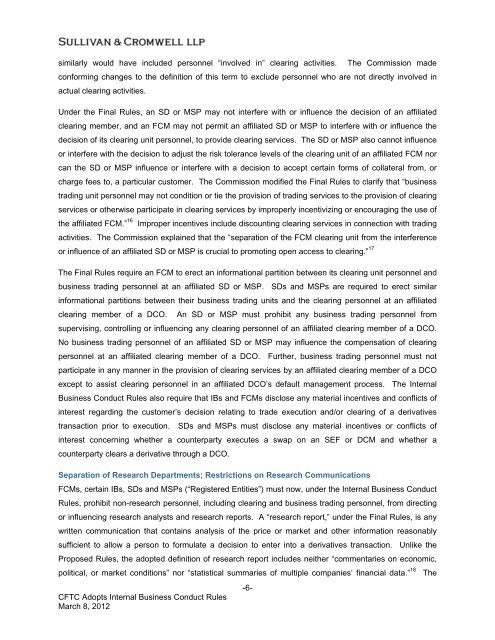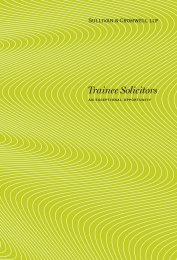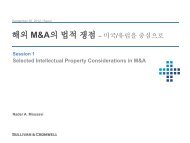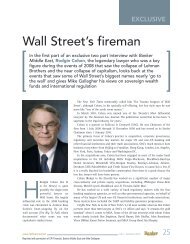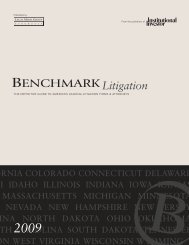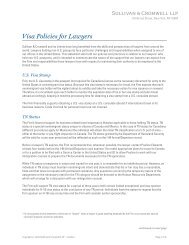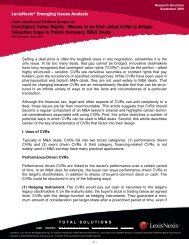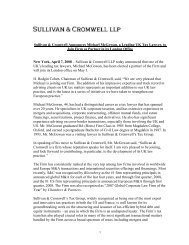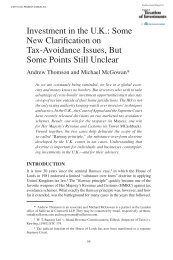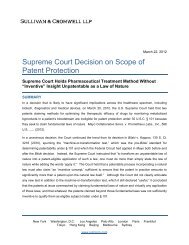CFTC Adopts Internal Business Conduct Rules - Sullivan & Cromwell
CFTC Adopts Internal Business Conduct Rules - Sullivan & Cromwell
CFTC Adopts Internal Business Conduct Rules - Sullivan & Cromwell
You also want an ePaper? Increase the reach of your titles
YUMPU automatically turns print PDFs into web optimized ePapers that Google loves.
similarly would have included personnel “involved in” clearing activities. The Commission made<br />
conforming changes to the definition of this term to exclude personnel who are not directly involved in<br />
actual clearing activities.<br />
Under the Final <strong>Rules</strong>, an SD or MSP may not interfere with or influence the decision of an affiliated<br />
clearing member, and an FCM may not permit an affiliated SD or MSP to interfere with or influence the<br />
decision of its clearing unit personnel, to provide clearing services. The SD or MSP also cannot influence<br />
or interfere with the decision to adjust the risk tolerance levels of the clearing unit of an affiliated FCM nor<br />
can the SD or MSP influence or interfere with a decision to accept certain forms of collateral from, or<br />
charge fees to, a particular customer. The Commission modified the Final <strong>Rules</strong> to clarify that “business<br />
trading unit personnel may not condition or tie the provision of trading services to the provision of clearing<br />
services or otherwise participate in clearing services by improperly incentivizing or encouraging the use of<br />
the affiliated FCM.” 16 Improper incentives include discounting clearing services in connection with trading<br />
activities. The Commission explained that the “separation of the FCM clearing unit from the interference<br />
or influence of an affiliated SD or MSP is crucial to promoting open access to clearing.” 17<br />
The Final <strong>Rules</strong> require an FCM to erect an informational partition between its clearing unit personnel and<br />
business trading personnel at an affiliated SD or MSP. SDs and MSPs are required to erect similar<br />
informational partitions between their business trading units and the clearing personnel at an affiliated<br />
clearing member of a DCO. An SD or MSP must prohibit any business trading personnel from<br />
supervising, controlling or influencing any clearing personnel of an affiliated clearing member of a DCO.<br />
No business trading personnel of an affiliated SD or MSP may influence the compensation of clearing<br />
personnel at an affiliated clearing member of a DCO. Further, business trading personnel must not<br />
participate in any manner in the provision of clearing services by an affiliated clearing member of a DCO<br />
except to assist clearing personnel in an affiliated DCO’s default management process. The <strong>Internal</strong><br />
<strong>Business</strong> <strong>Conduct</strong> <strong>Rules</strong> also require that IBs and FCMs disclose any material incentives and conflicts of<br />
interest regarding the customer’s decision relating to trade execution and/or clearing of a derivatives<br />
transaction prior to execution. SDs and MSPs must disclose any material incentives or conflicts of<br />
interest concerning whether a counterparty executes a swap on an SEF or DCM and whether a<br />
counterparty clears a derivative through a DCO.<br />
Separation of Research Departments; Restrictions on Research Communications<br />
FCMs, certain IBs, SDs and MSPs (“Registered Entities”) must now, under the <strong>Internal</strong> <strong>Business</strong> <strong>Conduct</strong><br />
<strong>Rules</strong>, prohibit non-research personnel, including clearing and business trading personnel, from directing<br />
or influencing research analysts and research reports. A “research report,” under the Final <strong>Rules</strong>, is any<br />
written communication that contains analysis of the price or market and other information reasonably<br />
sufficient to allow a person to formulate a decision to enter into a derivatives transaction. Unlike the<br />
Proposed <strong>Rules</strong>, the adopted definition of research report includes neither “commentaries on economic,<br />
political, or market conditions” nor “statistical summaries of multiple companies’ financial data.” 18 The<br />
<strong>CFTC</strong> <strong>Adopts</strong> <strong>Internal</strong> <strong>Business</strong> <strong>Conduct</strong> <strong>Rules</strong><br />
March 8, 2012<br />
-6-


